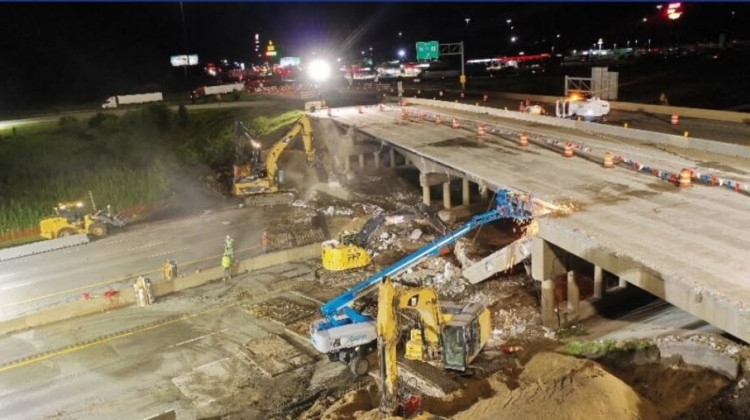
Floyd County officials are renovating the City-County Building in New Albany to turn it into a judicial center.
John Boyle / LPMThe Floyd County Council is considering a .07% tax that would help support funding of staffing expenses within the county’s judicial system. It follows a state law that went into effect at the start of the month allowing local governments to create such a tax.
The shortfall comes after the council approved salaries for many county employees last year, which went into effect at the start of the year. There’s also a 3% cost of living increase in discussion for next year.
During a public hearing on the matter this week, Council President Denise Konkle referenced a study showing Floyd County trails other areas in terms of employee salaries.
“We were very far behind in some cases, in a lot of cases, with what other counties were paying their employees for the same positions, and we were losing people,” Konkle said, referring to the salary study.
For households with an adjusted gross income of $70,610, the new tax would mean around $50 a year or $4.12 per month, members of Reedy Financial Group, which advises the council on fiscal matters, explained during a special meeting in June.
A household making $112,000 would pay around $80 per year. Those making $186,000 would pay around $132.
The advisers said the local income tax also allows the county to get more bang for its buck rather than a public safety tax, which would be split between the county and municipalities.
Konkle said at a public hearing earlier this week that if they approve the new tax, it will free up money currently used on judicial salaries from the general fund.
At that hearing, residents spoke out against the new tax.
One man asked why the county is commissioning studies about raising taxes rather than doing an efficiency study to see how to cut costs. He also said there is redundancy and waste with the county and City of New Albany each having departments for services like parks and 911 operations.
Another resident said he wanted more information on how the money would be used.
“What has happened is that our expenses have outpaced our revenue growth,” Konkle said. “And so we're in a situation where we don't have a permanent revenue stream to support our expense stream. And I think that's why we're here tonight … to find a permanent way to make those two match.”
Elaine Jenkins, who lives in Greenville, said a tax hike would impact some more than others. It’s a cost she said she won’t pass on to her rental tenants, who have lower incomes.
“So when we're spending the county's money, think about people that really have a hard time making it from day to day,” she said.
Floyd County Council member Danny Short criticized the council’s decision to move forward with salary increases without what he said was a good plan to fund them.
“We put the cart before the horse, which happens a lot … by giving raises … whether they were deserved or not without a way to pay for them other than we'll raise a tax when we need to,” he said. “We had no other explanation for how it was going to be funded.”
He also told LPM News in an email he doesn’t support the new tax.
“We haven’t done enough work on alternative resources for funding and cost-cutting,” he said. “There are also too many unknowns about what this tax will actually cover.”
The public will have another chance to weigh in on the proposal at a second hearing at 6 p.m. July 26 at the Pine View Government Center, 2524 Corydon Pike. Short said the council will likely open a meeting following that hearing and vote on the tax that night.
Coverage of Southern Indiana is funded, in part, by Samtec Inc. and the Hazel & Walter T. Bales Foundation.
9(MDAyMzk1MzA4MDE2MjY3OTY1MjM5ZDJjYQ000))
 DONATE
DONATE






 Support WFYI. We can't do it without you.
Support WFYI. We can't do it without you.